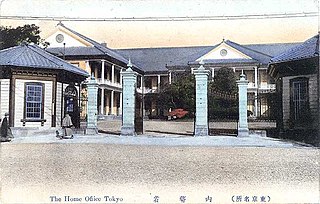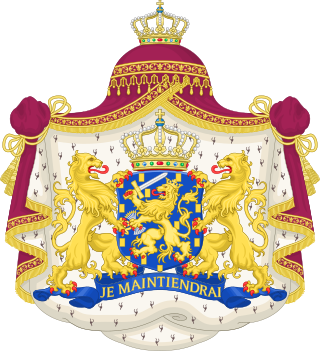
The United States Department of Labor (DOL) is one of the executive departments of the U.S. federal government. It is responsible for the administration of federal laws governing occupational safety and health, wage and hour standards, unemployment benefits, reemployment services, and occasionally, economic statistics. It is headed by the Secretary of Labor, who reports directly to the President of the United States and is a member of the president's Cabinet.

Welfare, or commonly social welfare, is a type of government support intended to ensure that members of a society can meet basic human needs such as food and shelter. Social security may either be synonymous with welfare, or refer specifically to social insurance programs which provide support only to those who have previously contributed, as opposed to social assistance programs which provide support on the basis of need alone. The International Labour Organization defines social security as covering support for those in old age, support for the maintenance of children, medical treatment, parental and sick leave, unemployment and disability benefits, and support for sufferers of occupational injury.
Minister of labour or labor is typically a cabinet-level position with portfolio responsibility for setting national labour standards, labour dispute mechanisms, employment, workforce participation, training and social security.

The Ministry of Health, Labour and Welfare is a cabinet level ministry of the Japanese government. It is commonly known as Kōrō-shō (厚労省) in Japan. The ministry provides services on health, labour and welfare.
Many both in and outside Japan share an image of the Japanese work environment that is based on a "simultaneous recruiting of new graduates" and "lifetime-employment" model used by large companies as well as a reputation of long work-hours and strong devotion to one's company. This environment is said to reflect economic conditions beginning in the 1920s, when major corporations competing in the international marketplace began to accrue the same prestige that had traditionally been ascribed to the daimyō–retainer relationship of feudal Japan or government service in the Meiji Restoration.
Social welfare in Sweden is made up of several organizations and systems dealing with welfare. It is mostly funded by taxes, and executed by the public sector on all levels of government as well as private organizations. It can be separated into three parts falling under three different ministries. Social welfare is the responsibility of the Ministry of Health and Social Affairs. Education is the responsibility of the Ministry of Education and Research. The labour market is the responsibility of the Ministry of Employment.

The Home Ministry was a Cabinet-level ministry established under the Meiji Constitution that managed the internal affairs of Empire of Japan from 1873 to 1947. Its duties included local administration, elections, police, monitoring people, social policy and public works. In 1938, the HM's social policy was detached from itself, then the Ministry of Health and Welfare was established. In 1947, the HM was abolished under the Supreme Commander for the Allied Powers restoration, then its administrative affairs were proceeded to the National Police Agency, the Ministry of Construction, the Ministry of Home Affairs and so on. In 2001, the MOHA was integrated with the Management and Coordination Agency and the Ministry of Posts and Telecommunications, then the Ministry of Public Management, Home affairs, Posts and Telecommunications was established. In 2004, the MPHPT changed its English name into the Ministry of Internal Affairs and Communications. In other words, the MIC is the direct descendant of the HM.

The Ministry of Social Affairs and Employment is the Dutch ministry responsible for social affairs, relations between employers and employees, social security, trade unions and emancipation. It was established in 1918 as the Ministry of Labour and had several name changes before it became the Ministry of Social Affairs and Employment in 1981. The ministry is headed by the Minister of Social Affairs and Employment, currently Karien van Gennip of the Christian Democratic Appeal.
The Royal Norwegian Ministry of Labour and Social Affairs is a Norwegian ministry established in 1916. It is responsible for the labour market, the working environment, pensions, welfare, social security, integration, immigration, asylum, minorities and the Sami. Since 24 January 2020 the department has been led by Torbjørn Røe Isaksen.
The Ministry of Labour & Employment is one of the oldest and most important Ministries of the Government of India. This is an India's federal ministry which is responsible for enforcement of labour laws in general and legislations related to a worker’s social security. The Ministry aims to create a healthy work environment for higher production and productivity and to develop and coordinate vocational skill training and employment. However, Skill Development responsibilities, such as Industrial Training and Apprenticeship responsibilities were transferred to the Ministry of Skill Development and Entrepreneurship from 9 November 2014. The Ministry launched the National Career Service portal on 20 July 2015 to help bridge the gap between job providers and job seekers.

The Ministry of Labour and Social Welfare of Uruguay is the ministry of the Government of Uruguay that is responsible for conducting and carrying out policies related to labor activity in the country, as well as supervising social and food benefits.
A Department of Human Services (DHS) or Ministry of Human Services (MHS) is a national or subnational umbrella agency which is responsible for providing public assistance programs to the population they serve. Various aspects or alternate names include social security, social affairs, human resources and welfare.
The social security system in Spain is its principal system of social protection. The concept of social security first appeared in Spain in 1883 under the Committee for Social Reform, it was expanded several times during the twentieth century and finally the right to social security was enshrined in the Spanish Constitution of 1978 under Article 41 which states "that the public authorities shall maintain a public social security system for all citizens, guaranteeing sufficient support and social benefits in situations of need, especially in the event of unemployment, and that the support and additional benefits shall be free".

The Ministry of Labour and Social Protection of the Population of the Azerbaijan Republic is a governmental agency within the Cabinet of Azerbaijan in charge of regulating the labour markets and ensuring social protection of the population of Azerbaijan. The ministry was headed by Salim Muslumov until 2018. Current minister of Labour and Social Protection of the Population is Sahil Babayev. He is appointed to this position based on presidential decree dated 21 April 2018.

The Ministry of Labour and Social Economy is the department of the Government of Spain responsible for planning and carrying out the government policy on labour relations and social economy.

The Ministry of Human Resources, abbreviated MOHR, is a ministry of the Government of Malaysia that is responsible for skills development, labour, occupational safety and health, trade unions, industrial relations, industrial court, labour market information and analysis, social security.
The Ministry of Labour is a ministry in the Burmese government responsible for the country's labour welfare and renders services to employers and workers. President Htin Kyaw combined Ministry of Labour, Employment and Social Security and Ministry of Immigration and Population to from the Ministry of Labour, Immigration and Population.On 1 August 2021, it was reformed as Ministry of Labour and Ministry of Immigration and Population following the formation of Caretaker Government by Min Aung Hlaing.

A ministry of social security or department of social security is a government entity responsible for social security affairs. It may be a ministry office, a department, or, as in the United States, a nominally independent agency.
A ministry of labour (UK), or labor (US), also known as a department of labour, or labor, is a government department responsible for setting labour standards, labour dispute mechanisms, employment, workforce participation, training, and social security. Such a department may have national or regional authority.

The Ministry of Human Resources and Social Development is a government ministry in Saudi Arabia was established in 2019 after merging Ministry of Labour and Social Development with Ministry of Civil Service. It is responsible for providing the community with development, support, and protection. The Ministry is also in charge of labor affairs and its related issues and policies. The current Minister is Ahmed al-Rajhi who was appointed in June 2018.
According to the Global Competitiveness Report 2019, compared to the previous year, the Kingdom advanced 13 ranks in the labor and production market efficiency index. Also, it advanced 17 ranks from 2018 in both the “Small and Medium Enterprises Finance” and “Availability of venture capital” respectively, moving up 5 ranks in human capital skills, innovation ability and business dynamics.
The Ministry was able to gain EFQM certificate from the European Foundation for Quality Management EFQM as the first entity in the Kingdom. It obtained this certificate in the year 2021 after it was able to successfully comply with the standards of the European Institutional Excellence Model through several areas, including: developing an electronic friendly settlement system, Raising the efficiency of spending and rationalizing consumption in the field of unified transport, and unifying methods of communication with the ministry's beneficiaries through the unified call center.










